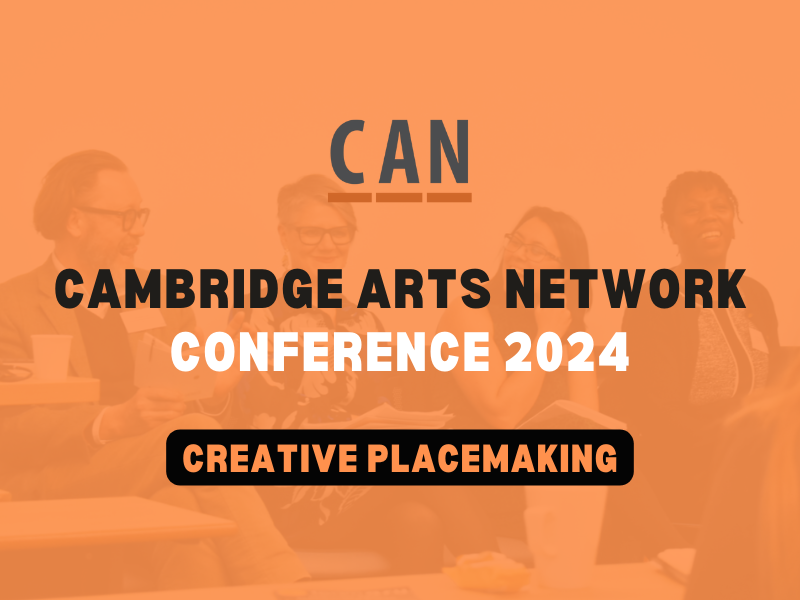
Buy Tickets
Tickets are not on sale for this event yet.
The arts and culture play an essential role in informing our identities and our sense of place. Our buildings, our streets and our public art determine our mental maps and our perceptions of the place in which we live. And providing opportunities for artists and creative practitioners can contribute directly to its economy and society. At a time when the city of Cambridge and its fringe communities are expanding fast, the CAN conference this year is going to explore in detail how we create our places, and how we can make them better. The conference this year will have something for everyone interested in the arts, and in how to make a city a centre of creativity.
- How do we define sense of place, and how does it connect with civic pride?
- How do we factor culture into the planning process?
- How do we involve younger people in the decisions about place-making?
- How do we make our places healthier to live in?
- How do we nurture creativity and economic growth?
- How can we use gaming to model more exciting urban spaces?
- And how do we create excitement around our night-time economy?
With a keynote address from Professor Flora Samuel, Head of the Department of Architecture at Cambridge University, the conference will also feature distinguished speakers from the arts, academia, local government, and youth organisations. With plenty of opportunities for questions and participation from delegates, the conference will be a stimulating exploration of how creative place-making can change lives.
In partnership with Anglia Ruskin University and The University of Cambridge.
Conference Keynote Speakers:
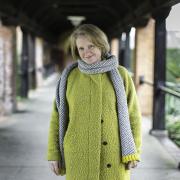
Flora Samuel is Professor of Architecture and Head of the Department of Architecture in the University of Cambridge. She is leading on the development of the Cambridge Room, a new engagement space for the city and its rural hinterland. Her work is focused on the development of a more inclusive planning system focused on collaborative map making. Her most recent book Housing for Hope and Wellbeing was published last year.
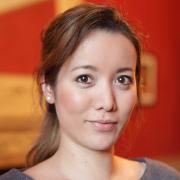
Caroline Macfarland will talk through some practical insights and tips for engaging young people in community and cultural life. She will draw from her experiences supporting participatory research and engagement projects with young people and young adults, including the young people's participatory evaluation of Eastbourne ALIVE, Power to Change-funded research on how community enterprises engage with young stakeholders, youth-led consultation on the Cultural Education Plan, and resident engagement work on the Grahame Park estate in London.
Caroline Macfarland is an entrepreneur, social researcher, and strategic communications expert with over 15 years of experience working in policy and strategy roles in think tanks, charitable foundations and agencies. She is the Founder of Common Futures, a think-and-do tank specialising participatory research and engagement with young people. Caroline has also worked as a special adviser at the Big Lottery Fund (now The National Lottery Community Fund), one of the founding team members of the foundation Power to Change and managing director of think tank ResPublica. In 2015, she was named one of Management Today’s 35 women under 35 and in 2018 she made the WISE100 list of leading women in social enterprise.
CAN Conference Sessions:
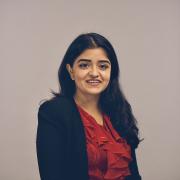
Uncover the power of integrating youth voices in placemaking. Explore global examples, from San Antonio's underpass transformation into a playscape, to Beirut's Minecraft-co-designed public stairs. With specific insights from Riva’s recent experiences leading on-campus placemaking at Girton College and a youth placemaking programme for 30+ teenagers at the US’s National Building Museum, discover practical tools and tips to enable sustainable, inclusive, community-empowering and youth-led activation of vibrant and thriving places.
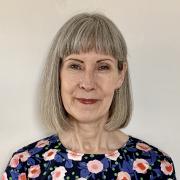
Evidence shows that most of the things that make people healthy lie outside the NHS: in particular the homes and neighbourhoods people live in have a major impact on their health. So what makes a healthy place? What role should the arts play in healthy place-making? And how, practically, can councils and developers work together to ensure that arts practitioners can be included in the (often long-drawn out) process of developing new places or improving existing places?
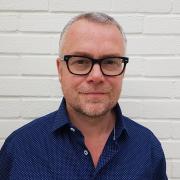
‘Pride in place’ was one of the key elements of the government’s approach to levelling up the country. But what is pride in place? And how can it be measured? At a time of ever-increasing pressures on budgets and the real possibility that local authorities will have to dispose of key community assets, this session will draw on research carried out by the Bennett Institute of Public Policy to explore how questions of belonging and attachment can best be measured, as well as considering the role of cultural infrastructure in creating a sense of civic pride.
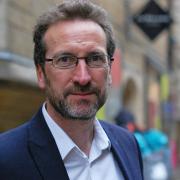 Factoring Culture in the Planning Process
Factoring Culture in the Planning Process Stephen’s session will explore the relationships between culture and the planning process and the opportunity that a deeper understanding amongst practitioners might provide to deliver better outcomes for places and the community.
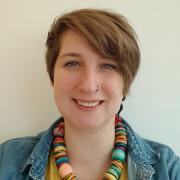
Producer, Bristol' s Playable City
Play is transformative – it invites curiosity, stimulates rich interaction, can inspire joy, and can be subversive, but what happens when we play in the city?
Playable City seeks to use play and creative technology to create moments of pause and joy while thinking about our relationship to public space.In this session Playable City producer, Emma Boulton, shares projects and insights from the programme whilst sparking conversations on how play can inspire us to reimagine our cities and public spaces.
Emma is a producer at Watershed in the Pervasive Media Studio. She is the producer for Playable City, Sandbox programmes, and Connecting Through Culture As We Age. Previously she led an international activity strand for the Bristol and Bath Creative R+D programme where she focused connecting the cluster to international conversations and opportunities. Her role is to support a collaborative programme of research and business to improve the performance of the creative industries in the region ensuring they continue to flourish.
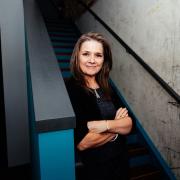
It has long been recognised that artists and creatives can have a transformational effect on area vibrancy and regeneration. Sometimes this happens organically and other times it happens in response to an intervention or opportunity. Taking over fifty years of learning, there are many different models to consider that support and inspire a creative ecology. This session will share examples of working with artists and creative industries to grow area identity.
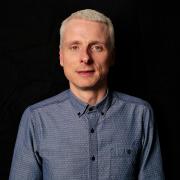
Anglia Ruskin University (ARU) have ambitious plans to develop our campus to provide a multi-functional digitally enabled space for learning, research, and innovation. Our Creative Quarter* will generate a strong sense of community for students, staff and our partners and local community.
It will be a focus for creativity, idea generation and a catalyst for pioneering new ways of working through collaboration. An inspiring creative community with cutting-edge equipment and facilities. It will bring together a unique combination of art and design, creative technology, education, humanities and social science and industry.
This session will involve an overview of the proposed scheme and a scoping workshop with attendees. The workshop will explore how these proposed new spaces and facilities could support local and regional creative individuals and organisations. *subject to planning.
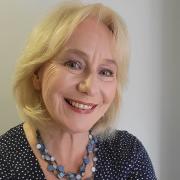
What do we mean by ‘night time economy’? Breaking down traditionally held ideas about the NTE – it is not about alcohol, pubs, bars and clubs…it has changed, so what do we mean, and how has the offer and our expectations changed. Has the pandemic changed the way we use our cities? What do we expect from our town and city centres.. historically town and city centres have been the economic and social heart of the local community. How do we ensure they meet our social and economic expectations. In meeting those expectations what are the challenges for us all: safety, perceptions v reality.. and access – transportation, all users including employees. How do we offer variety and ensure it is right, one which creates that ‘buzz’ and desire to use the city – a place for everyone, recognizing and catering for the needs of your consumer. Can we use our spaces more creatively, the open spaces and built environments by animating space and place creatively and with variety.. making our city and fun and safe place to be regardless of what you want to do and how you use the city. Each city and town is different but what can we learn from other places across the Country and from European cities, we take a look at examples of how cities have adapted.
The prestigious CAN Awards will be presented at 5pm, including awards for the leading Youth Ambassador, the most Innovative Business Leader, the most Innovative Arts organisation, and the person or organisation which has made the biggest Contribution to sense of place.
The conference will be followed by a drink’s reception and live entertainment from leading local musicians.
Conference Order of the Day:
|
09:00 - 09:45 |
Arrivals: Registration & Breakfast |
|
09:45 - 10:00 |
Formal Welcome |
|
10:00 - 10:25 |
Morning Keynote: Cultural Engagement and Consultation for Planning |
|
10:30 - 11:15 |
Session 1: (Place)Making Our Future OR Making Healthy Places |
|
11:15 - 11:40 |
Break: Coffee & Networking |
|
11:45 - 12:30 |
Session 2: Measuring Civic Pride OR Factoring Culture in the Planning Process |
|
12:40 - 13:00 |
Panel Discussion: Morning Learnings & Reflections |
|
13:00 - 14:00 |
Lunch: Food & Networking |
|
14:00 - 14:25 |
Afternoon Keynote: Youth Participation in Placemaking and Culture |
|
14:30 - 15:15 |
Session 3: Gaming Your Places: Placing Play at the Heart of Cities OR The Role of Arts & Culture in Placemaking |
|
15:15 - 15:40 |
Break: Coffee & Networking |
|
15:45 - 16:30 |
Session 4: Making a New Creative Quarter OR Creating a Buzz: The Night-time Economy |
|
16:40 - 17:00 |
Panel Discussion: Afternoon Learnings & Reflections |
|
17:00 - 17:15 |
Cultural Strategy: Discussion & Shared Vision |
|
17:15 - 17:30 |
CAN Awards & Closing Statement |
|
17:30 - 18:00 |
Networking: Drinks |
|
18:00 - 19:30 |
Evening Event: Performance Showcase & Drinks |
|
19:30 |
End |
TBC